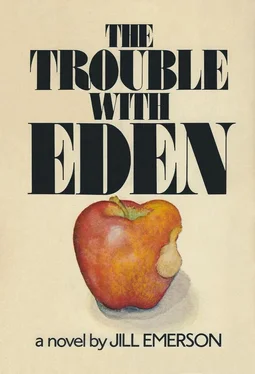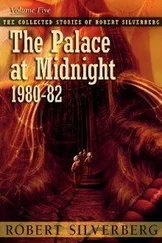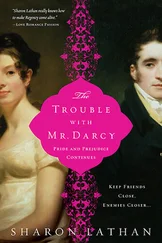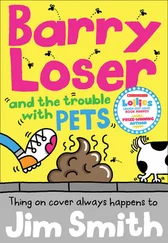It wasn’t just that she loved the book. It was that she liked it for all the right reasons. There were things he had done not knowing whether they would work or not. Some bits and pieces were important to him but would have no individual impact on readers. A book was always quite different for the person who wrote it. Its most perceptive reader could not see it in the same way. He was certain it was the same with the product of anyone’s labor; the fruit tasted differently to the man who planted the tree.
But how close she had come to reading the book through his own eyes.
They talked the day away. Much of the talk concerned The Edge of Thought. She discussed its characters as if they existed, as they did in fact exist for him and for her. Years ago, Anita had read his books with the same single-minded enthusiasm. But Karen read them differently. Anita had always been the critic; she had assumed the role with One If by Land and had always felt comfortable in it. She had been a valuable critic, a sensitive one, but a critic could never satisfy you as a fan could. Even if a critic responded with wholehearted unequivocal approval, it was still an outside view, an objective view, and the success he wanted was of a subjective sort.
So they talked a great deal about the book, but they talked of other things as well. He had felt close to her in all the months since she had moved into his house, had treasured this closeness as he treasured little else, and today he felt far closer to her than ever before. They talked through breakfast, talked over coffee, talked in the garden and in the woods. And when they returned to the house and went to the living room to talk some more she asked him if it was too early for the first drink of the day.
“I already had the first drink of the day,” he had said, and told her how keyed up he’d been waiting for her reaction.
“Then it can’t be too early. I’ll make them. I want to propose a toast. How do you propose a toast?”
“You just go ahead and do it.”
“To The Edge of Thought ,” she said. They touched glasses and drank. “Now are we supposed to throw them in the fireplace?”
“Mrs. Kleinschmidt wouldn’t approve.”
She started to giggle. He asked her what was funny, but she kept laughing and couldn’t stop. He laughed along with her without having the slightest idea what he was laughing at.
She said, “I was going to say... oh, this is so silly!”
“Will you for Christ’s sake tell me what we’re both hysterical about?”
“It’s so far-out. I thought about saying, ‘Well, screw Mrs. Kleinschmidt,’ and I thought of you saying, ‘Who in hell wants to screw Mrs. Kleinschmidt?’ and I just—”
“Well, who the hell would?”
She laughed again, spun around and pitched her glass into the fireplace. He hurled his after it.
“Screw Mrs. Kleinschmidt!” he said.
They drank their second toast to Mrs. Kleinschmidt, and this time they did not smash the glasses. Instead she filled them again and he said something about calling Mary Fradin in the morning. She said Mary Fradin would love the book, too, and he said it didn’t much matter if she did or not as long as she sold it properly.
“Then screw Mary Fradin,” she said.
“I’ll drink to that.”
“Why? Were you planning to screw Mary Fradin?”
“I already did,” he said.
He told her that story, and then she told him a story about Anita’s husband and one of her girlfriends, and he told another story and she told another story, and then he observed that it was Sunday and that one should never finish a book on Saturday night. Happy? No man on earth had ever been so happy.
When they returned from dinner she automatically made drinks while he filled a pipe. They had both been reasonably drunk when they left for dinner, but their euphoria was so great that the alcohol did not slow them down. He felt that he could drink all night without getting tired or thick-tongued. All the liquor did was heighten their mood.
“We should have had wine,” he said.
“It was a dynamite dinner.”
“Uh-huh. Would have been better with wine, though.”
She considered. “You know what would have been great? Better than wine? Grass.”
“At Tannhauser’s? I can just see Trude passing around joints. What’s the matter?”
“I was picturing it. Offering them around in that apple strudel accent. No, not with dinner. Before dinner. It really does fantastic things for the taste of food.”
“I never heard that.”
“Oh, sure. It makes you more aware. Even with rotten food. I mean like school cafeteria food. Not all the time, but if you happened to be into a food thing. Like one time I had this salmon croquette. They always had things like that, salmon croquettes, stuffed beef heart, all this glop, and I was really wrecked one day and I got into this salmon croquette with this goopy yellow sauce all over it, and I could taste like all the different things that were happening there. And at the same time I was aware that it was cruddy. I kept thinking, wow, this is delicious, and wouldn’t it be great if I was eating something I liked?”
“I remember it works that way with music,” he said. “I never thought of it in connection with food.”
“It’s the same idea. Getting right down into things.”
“I guess that makes sense.”
“Oh, wow!”
“What?”
“What you said. Do you smoke?”
“Before you were born,” he said. “But not since.”
“Really?”
He nodded. “Ages ago. After the war, when I was living in the Village. Just two or three times. At parties.”
“I didn’t realize people were into grass in those days.”
“‘Those days.’ Yes, back before the Flood.”
“I mean—”
“It was part of the Bohemian scene, although that word was beginning to die out by then. And I was never that much of a Bohemian. I never knew anyone who smoked very frequently. It was hard to get unless you had friends who were jazz musicians or unless you knew people in Harlem.”
“And you never smoked after that.”
“No. It wasn’t really a part of my life. And no one talked about it.”
“Did you dig it?”
He sipped his drink. “I’m trying to remember. My recollection is pretty vague. I didn’t get high the first time, I remember that. The other times I did, and I think I remember what it was like. I believe I enjoyed it well enough.”
“Would you try it again ever?”
“I wonder,” he said. “I suppose I might. You know, I’ve never really thought about this, but it’s surprising I haven’t tried it again in all these years. At least since, oh, at least in the past few years.”
“Since the divorce? Is that what you were going to say? Anita smokes.”
“Your mother?”
“That’s weird, isn’t it? All their friends do, which is probably why she does. But I’m not supposed to.” She told him of the conversation they had had on the subject. He laughed, thinking how typical it was of Anita in recent years. He supposed it was typical parental hypocrisy and was oddly pleased that he was not hypocritical in that sort of way.
“Daddy? Would you like to get stoned?”
“Why, I suppose I’d try it again,” he said. “Why not?”
“’Cause I could really dig smoking together. The two of us, I could dig that.”
“I’m afraid I don’t have a connection in the area. Is that word still current? I could probably get some in New York.”
“You wouldn’t have to go that far.”
“I gather there’s some in New Hope, but I wouldn’t know who to ask.”
“Oh, you could say there’s some in New Hope. If Mechanic Street ever caught fire, the whole county would be stoned for a week.” She drank some more of her drink. Her face was thoughtful. At length she said, “You wouldn’t have to leave the house.”
Читать дальше












